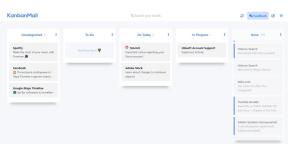AI Product Manager - course 150,000 rub. from Netology, training 11 months, Date November 28, 2023.
Miscellaneous / / November 30, 2023
What you will learn
Understand AI and machine learning technologies
Determine opportunities for AI implementation six months in advance
Create a roadmap for introducing AI into a product
Define team requirements and product metrics
Calculate project and data security risks
Manage budget and product development processes
Director of the web department, Skolkovo Business School Worked at Computerra, Independent Media Sanoma Magazines, Rambler, Eda.ru, TM Beeline, Uninum and RUSNANO.
Founder of the Conscious Business Laboratory, organizational development consultant, executive coach
An expert in business transformation, develops leaders and builds antifragile teams of the future, applying modern advances in neuroscience and psychology. Master's in Psychology. Since 1999 in IT. Since 2010, she has held senior positions in large international organizations: Kaspersky Lab, Plazius, DSSL. Clients include: Sberbank, VTB, Tinkoff, Severstal, Nefteservis, Geosys, Group of Companies PIR, Magnit, Dixy, Globus Gourmet.
Product management
Master all stages of the product life cycle, gain skills for effective interaction with a team and project management. This base is necessary for further in-depth development of the AI product.
Introduction to lean startup and customer development
Learn to formulate product ideas and hypotheses. You will learn how to test them and create an MVP product.
• What is the product
• Stages of product development, methods of searching and validating ideas
• Customer development
• HARDI Hypothesis Testing Cycle
• MVP creation
• How to understand when it’s time to move from MVP to product
Product management based on financial indicators
Learn how to use financial models (unit economics, P&L) to manage your product. Learn to plan, analyze the current state and make decisions based on financial indicators.
• Deal, funnel and unit
• Unit economics
• P&L and criteria for accounting for expense and income items
• Workshop on modeling
• Product analysis of the site
• Market and competitor analysis
• Differences in b2b and b2c management
• Digitalization of offline business
Product analytics
You will understand why analytics is needed and how to work with it. You will understand which services to use and which product metrics to track.
• Product analytics and key product metrics
• Structure of product metrics, KPIs and data visualization
• Web analytics tools and principles for calculating basic metrics
• Analysis of competitors’ audiences and specialized reports from analytics systems
• A/B tests: design, execution, analysis of results, decision making
User interfaces and product design
You will learn why user experience design is needed and how to effectively use it to increase product conversion.
• The role of design in the product life cycle
• Main stages of working on the product
• Efficiency of product work
• Homework and design feedback
• CJM: customer journey visualization
• Prototypes and their testing
• Prototypes: practice
Creating an IT product without code
Find out where and why no-code tools are used. You will understand how they differ and what features they have. Learn to work with Tilda, Airtable, Chatforma, Glide, Adalo, Integromat, Bubble, and also write technical specifications for developers.
• Introduction to no-code development
• Overview of no-code tools
• Landing page design
• Chatbot design
• Mobile application design
• Integrations and business processes
Agile project management methodologies
Learn to differentiate between “risk management” and “risk limitation” approaches. You will learn how to build a triad of levels from goal setting through the team to the product. You will be able to manage the product backlog.
• Managing the work list in the face of constant changes
• Backlog creation and work list management in an environment of continuous change
• Creation of a continuous work flow and value stream map
• Formation of a team structure for the customer’s tasks
• Scrum Basics
• GetKanban game
• Features of project management in IT
• Principles of delegation
• How to prepare for the presentation of your product or project
Soft skills for a product manager
You will understand why conflict situations arise and how they can be avoided. Learn to resolve conflicts using proven technologies and behavior patterns. You will be able to use creative techniques to effectively make collective decisions.
• Adaptability to change
• How to make decisions
• Proactive approach to work tasks
• Conflict resolution
• Collective decision making and creative techniques
Product Management Strategy
Learn to define a strategy and use it wisely throughout the entire product life cycle.
• Working with the backlog and feature prioritization techniques
• Building a product roadmap and strategic planning
• Working with technology cycles
• Growth hacking: product multiple growth
• Processes in the product team and interaction with development and marketing
• How to sell your idea to stakeholders and business customers
Final project. Product concept
You will conduct a niche and competitor analysis, create a list of hypotheses, and develop the first product prototype. Calculate the economy and build a system of metrics. This will be a full presentation on the product.
• Niche and competitor analysis
• Drawing up hypotheses
• Creation of the first prototype
• Economic calculation
• Construction of a system of metrics



